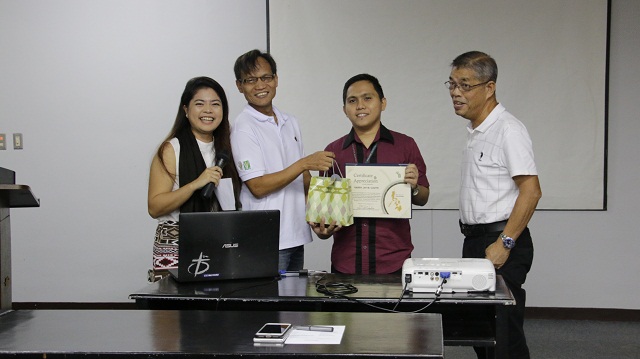A student research has found out bacteria that can enhance growth and yield of rice.
According to Dr. Eduardo Jimmy P. Quilang, head of PhilRice’s Agronomy, Soils, and Plant Physiology Division, the research dubbed as Enhancement of Growth and Yield of Aerobic Rice (Oryza sativa L.) by Plant Growth-Promoting Rhizobacteria was carried out by Harry Jay M. Cavite, a graduate student from the Central Luzon State University.
In a seminar held at PhilRice Central Experiment Station, Cavite revealed the bacteria called rhizobacteria as effective growth promoters of rice in vitro (taking place outside a living organism such as test tube).
He elaborated that he conducted the research into three studies. The first study isolated, screened, selected, and identified rhizobacterial isolate (a culture of microorganisms that was set apart for a study) the from upland rice ecosystem. Twenty-five rhizobacterial isolates were obtained from upland rice rhizosphere (the portion of soil surrounding a plant root). From these isolates, four were selected to proceed for examination in the next studies. These isolates were selected based on their plant growth-promoting activities.
The second study evaluated the selected isolates in enhancing rice seedling growth in vitro using PSB Rc23 seedlings. Significant results of this study show that two isolates had better effect on shoot (isolate Ralstonia pickettii) and root length (isolate IBBw1a) by 23% and 60%, respectively, compared with the control treatment. Another significant result is that isolate IBBw1a performed 53% better than control in terms of seedling vigor.
From in vitro, the third study examined the isolates under screenhouse conditions. Isolates were studied for two factors: different soil treatments and inoculation-fertilization treatments. Results show that one isolate (A. delafieldii) in combination with half fertilization rate, while inferior to treatment with 100% recommended rate of inorganic fertilizer, has comparable growth promotion in terms of root fresh weight, shoot and root oven dry weights, plant height, productive tiller count, grain yield, and NPK uptake.
In his conclusion, Cavite said isolates were proven to be effective growth promoters in vitro but not totally effective under screenhouse conditions. He also recommended further assessment of rhizobacteria under field conditions. Another recommendation is to look into the use of molecular techniques to identify and further assess the characteristics of selected rhizobacterial isolates.
After presenting his study, Cavite conversed with PhilRice researchers in an open forum. Here, alternative recommendations for further studies were discussed.
The seminar is a good venue for student researchers like Cavite to improve their research and to also stir discussion on technologies that can be used in overcoming the threats of food insecurity.
Cavite is finishing his master’s degree on crop science. He is also a Department of Science and Technology (DOST) scholar and has received awards because of the said study. One of his awards is from the International Conference on Integration of Science and Technology for Sustainable Development.





